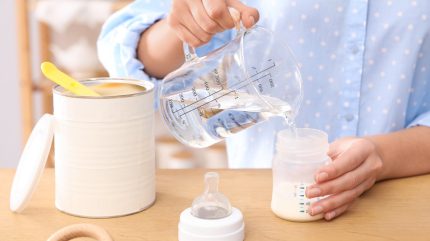
The Australian Competition and Consumer Commission (ACCC) has rejected a request from a local trade body to authorise an industry code designed to limit the advertising and promotion of infant formula.
The Infant Nutrition Council had sought approval to extend the Marketing in Australia of Infant Formula: Manufacturers and Importers Agreement (MAIF Agreement) and its associated guidelines for another five years.

Discover B2B Marketing That Performs
Combine business intelligence and editorial excellence to reach engaged professionals across 36 leading media platforms.
The MAIF Agreement, implemented in 1992, is a voluntary code that prohibits the advertising of infant formula for babies up to 12 months, as part of Australia’s commitment to the WHO’s guidelines.
It requires ACCC authorisation due to its nature as an agreement between competitors.
The ACCC’s refusal to authorise the infant formula marketing code is influenced by several factors, which it says undermines the “effectiveness” MAIF Agreement.
These include its voluntary nature, limited scope, and inability to address the full spectrum of digital marketing methods, the regulator said.

US Tariffs are shifting - will you react or anticipate?
Don’t let policy changes catch you off guard. Stay proactive with real-time data and expert analysis.
By GlobalDataIt said that the “conduct is likely to result in some public detriment by lessening competition and increasing barriers to entry resulting from competitors agreeing to limit promotional activity and policing one another’s marketing”.
ACCC acting chair Mick Keogh said: “We are not satisfied in all the circumstances that the MAIF Agreement is likely to result in public benefits that would outweigh the public detriments likely to result from it.”
The statement contrasts with the ACCC’s 2021 position, where it acknowledged a “fine balance between likely public benefit and detriment” and conceded the MAIF agreement will translate into a “net public benefit”.
An independent review by Australia’s Department of Health and Aged Care, published in April last year, found the current self-regulatory approach “no longer fit for purpose”.
The review recommended a stronger, mandatory regulatory framework to effectively control infant formula marketing and promote public health.
In October, the Department announced the Australian government’s plan to implement mandatory controls on infant formula marketing within an estimated two years, aligning with the review’s recommendation.
In addition, breastfeeding advocacy groups have also expressed in submissions that the MAIF Agreement is “ineffective” and should not be authorised, even temporarily.
Keogh added: “While the link between breastfeeding and improved health outcomes for mothers and children is undisputed, we are concerned there are several factors that undermine the effectiveness of the MAIF Agreement in protecting breastfeeding rates.
“We are not satisfied that the MAIF Agreement and associated guidelines are likely to result in a net public benefit to justify authorisation and consider that they are likely to result in some public detriment through reduced competition between infant formula manufacturers and importers, compared to the future without the conduct.”



